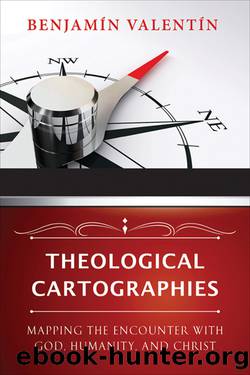Theological Cartographies: Mapping the Encounter with God, Humanity, and Christ by Benjamín Valentín

Author:Benjamín Valentín
Language: eng
Format: epub
ISBN: 9781611645538
Publisher: Westminster John Knox Press
Published: 2015-09-15T00:00:00+00:00
Cherishing Our Corporeality and Sexuality
A third development that has been blooming in contemporary Christian anthropology involves a deepening recognition of the importance of the body and a collective effort on the part of a growing number of theologians to foster an unequivocal, positive theology of the body. Over the last few decades, theologians have been working toward a consensus on the view that we are our bodies, and they have examined ways in which a more definitive body-positive theology can be developed and supported by using our Christian heritage. These theologians have been casting light upon the ways in which our bones and cartilage, organs and skin, all work together to make us living beings and upon the ways in which the complex levels of coordination between synapses, blood cells, and electrical signals in our brains allow us to be aware of ourselves as living beings.49 Their hope in doing so has been to help us comprehend that to be a human being is to be a bodily, material being. They have been trying to help us realize, in other words, that our bodies are integral to who we are. Moreover, these theologians have also been trying to help us view our bodies as gifts of Godâas gifts that spring from Godâs creative intentions and have a part in Godâs will for our flourishing. Accordingly, these recent body-focused theologians have been trying to bring us to behold, love, and celebrate our bodies. And there should be no doubt about the necessity of their efforts in the light of the tensive, shifting attitude the Christian tradition has historically displayed toward the body and its passions and the many contemporary societal struggles and injustices we face that are related to troubling perceptions of and dealings with human embodiment.
As we noted previously, one could legitimately say that Christian theology has always been a body-minded theology. There have always been subtraditions or streamlets of Christian theology that have acknowledged that the body is central to what it means to be human and âsaved,â and this historical fact allows us to say that Christianity has had relations with and cared about the human body. This is why I previously listed Christianityâs historical declarations about the human body and soul as one of its defining anthropological affirmations. Still, we must admit that Christian theologyâs relationship with the body has not exactly been smooth and positive all the way through.
Upon closer examination we will see that Christianityâs relationship with the body has been rocky, enigmatic, and to a certain extent noncommittal or fickle. On the one hand, you find many moments or instances of bodily affirmation in the history of Christian thought and practice. For example, we can point to Paulâs early insistence on an eschatological bodily resurrection for all faithful Christians (cf. Rom. 6:5); to Paulâs reminder that our bodies are the temple of the Holy Spirit (cf. 1 Cor. 6:19â20). We remember the Gospel writersâ characterization of Jesusâ ministry as one that included the touching
Download
This site does not store any files on its server. We only index and link to content provided by other sites. Please contact the content providers to delete copyright contents if any and email us, we'll remove relevant links or contents immediately.
Fangirl by Rainbow Rowell(9254)
How to Bang a Billionaire by Alexis Hall(8157)
Wonder by R. J. Palacio(8113)
The Thirst by Nesbo Jo(6944)
The Space Between by Michelle L. Teichman(6942)
Assassin’s Fate by Robin Hobb(6223)
Wiseguy by Nicholas Pileggi(5787)
The Night Circus by Erin Morgenstern(5226)
Paper Towns by Green John(5191)
The Kite Runner by Khaled Hosseini(5181)
Bittersweet (True North #1) by Sarina Bowen(4846)
Gerald's Game by Stephen King(4654)
Too Much and Not the Mood by Durga Chew-Bose(4348)
Pillow Thoughts by Courtney Peppernell(4284)
Goodbye Paradise(3811)
Twelve Days of Christmas by Debbie Macomber(3568)
Good by S. Walden(3560)
The Rosie Effect by Graeme Simsion(3469)
The Cellar by Natasha Preston(3346)
